Is an electric vehicle right for me?
In 2004 a small, and at the time relatively unknown, American company started the development of their first vehicle, a fully-electric road-legal car. Developed under the codename, DarkStar, and built based on the chassis of the Lotus Elise, the Tesla Roadster was released for sale in 2009 in the UK (2008 in the US). This BEV (battery electric vehicle) was able to do more than 200 miles on a single charge. But, of course, the car came with a price tag more suited to a supercar, costing £92,000.
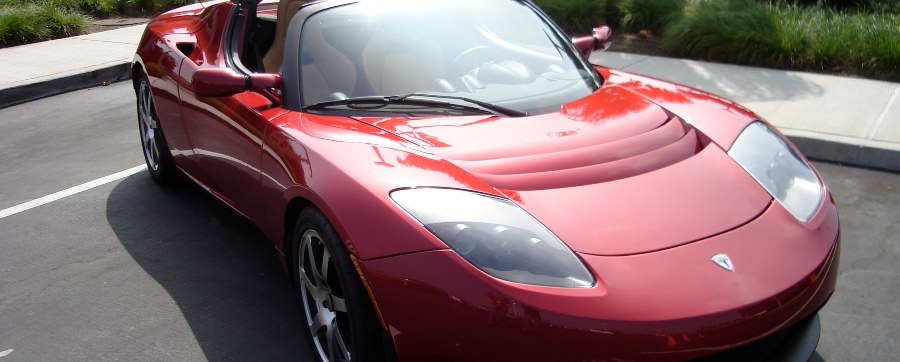
In 2019 manufacturers such as Bentley, Lotus, Mercedes and Volkswagen announced new electric vehicles (or concepts). Some, such as the Volkswagen ID.3, were released in 2020, some were postponed until 2021 and beyond.
There is no doubt that the market for electric vehicles is growing. By the end of 2020 there were over 100,000 electric vehicles on UK roads, with almost 67,000 new ones having been purchased and registered over the 12 months.
What electric vehicle should I buy?
With more drivers looking to move away from fossil fuels, they are starting to think about electric vehicles. And of course, that question raises more, such as ‘what is the best electric car?’ and ‘what should I know before getting an electric car?’. Motorists are starting to look in the direction of the electric car. There are many factors involved in making a decision when it comes to the right vehicle for you, including parking. Choosing a car is very specific to the individual, ensuring that your choice meets your needs.
What is best for one person is not necessarily what is best for the next one, so while we can recommend the cars that get the best mileage to the charge, or the best-sized vehicle for a family of four, ultimately, the decision is in the hands of the buyer.
In this article, we are going to look at what electric vehicles are currently available and provide an honest assessment about why they may, or may not, be the right vehicle for you and your individual needs.
Which electric vehicle has the best price?
Of course, this is subjective. Everyone has a different figure in mind when they are looking to make a large purchase, so while some could be looking in the direction of the smaller Smart car or the Renault Zoe, others will be staring at the latest e-Tron or the Tesla Model 3.
Which one would be right for you? As with petrol and diesel cars, the style of vehicle and the price varies depending on the manufacturer you are looking at.
Something which must be taken into consideration when purchasing an electric car is the fact that while the initial outlay could be higher than if you are looking to purchase a petrol or diesel car, the cost of filling up (though it will take longer) is much cheaper.
The Hyundai Santa Fe (7-seater) has a 65-litre capacity and to fill from empty to full, using the average cost of a litre of petrol in the UK*, will be an estimated £80.60. On a full tank you can travel roughly 523 miles.
When it comes to looking at the equivalent of the Santa Fe (or vehicles of a similar size), though the range is much lower, for the same distance (523 miles) it will cost between £21 and £26 to recharge the vehicle. This saving, on the cost of fuel, is something which is reflected across other vehicle types.
There are also additional advantages to purchasing electric, a reduced vehicle excise duty (or car tax), which can, in some cases be zero. Of course, if you’re travelling into and around London you will also have the advantage of not being charged to travel through the Low Emission and Ultra Low Emission Zones.
*As of 17 July 2020
Want to find out more about the costs of running an electric car? Download our exclusive guide here.
I need a big family car
If you’ve got a big family and are looking for a comfortable seven-seater, then, right now, choices are admittedly a little bit limited, but they are at both ends of the price spectrum.
If budget is not a concern, and you’re looking for a car with long-range then the Tesla Model X Long Range Plus should be at the top of your list. With a range of 348 miles per charge, a top speed of 155mph and a spacious interior with room for 7. Of course, there are savings to be found when it comes to the cost of charging, from empty to full is an average of £12.60 at home and from 20% to 80% on a public charger the cost is an average of £12.96. Tesla has produced two variants in the Model X line, and the prices for these range from just over £87,000 for the Long Range Plus model, and up to over £100,000 for the Performance model.
If you’re thinking about getting a 7-seater, but aren’t in a hurry, then, with a range of between 245 miles and 314 miles, the Tesla Model Y might be one to add to your list. Prices for the Model Y are currently being reported as starting from at just under £36,000. However, you’ll have to wait a while, as the release date for the Y has been pushed back into 2022.
At the other end of the spectrum when it comes to price for a generous seven-seater, is the Nissan e-NV200 Combi, though the range it offers isn’t quite as high as the Tesla, managing 124 miles before it needs to be charged. The Nissan e-NV200 and the smaller but more familiar Nissan Leaf both come with a 5-year vehicle warranty and an 8-year battery warranty, meaning the battery is covered for up to 100,000 miles of travel. The car is fitted with a rapid charger port, which means it can go from 20% to 80% in between 40 and 60 minutes – the perfect length of time if you’re at a supermarket or shopping in town – and costs around £5.18, with home charging from empty to full costing an average of £5.04. The total cost of an e-NV200 starts at just over £29,000.
Citroen is also joining the bandwagon. Already well-known for the spacious SpaceTourer, the company announced the e-SpaceTourer in June 2020. It’s expected that the 8-seater EV will have a 148-mile range and quick charging. With an expected starting price of almost £50,000, the first models are expected to be available in the UK in mid-2021.
I need a family car
If you’re looking for a slightly smaller car, with space for 4 or 5, then you’re in luck. This segment of the market is much larger, with far more manufacturers catering for the smaller family. The battery range goes from 100 miles all the way up to 325 miles, with prices also varying from around £24,000 right the way up to over £100,000, so there is something for every budget.
Of course, the type of vehicle available in this group also varies, including saloon, SUV, and practical cars including the city car and hatchback, so we’ll be breaking them down by vehicle type in this category, which will give a much clearer impression of what is available at different levels of budget.
Saloon
]If you’re looking for a saloon, perhaps something that can be used for work and home, with a little bit more space in the back then there are a number of different cars to choose from. Prices for models in this sector start from just over £27,000 rising all the way up to over £100,000. This is the most expensive segment if you’re looking for a small family car.
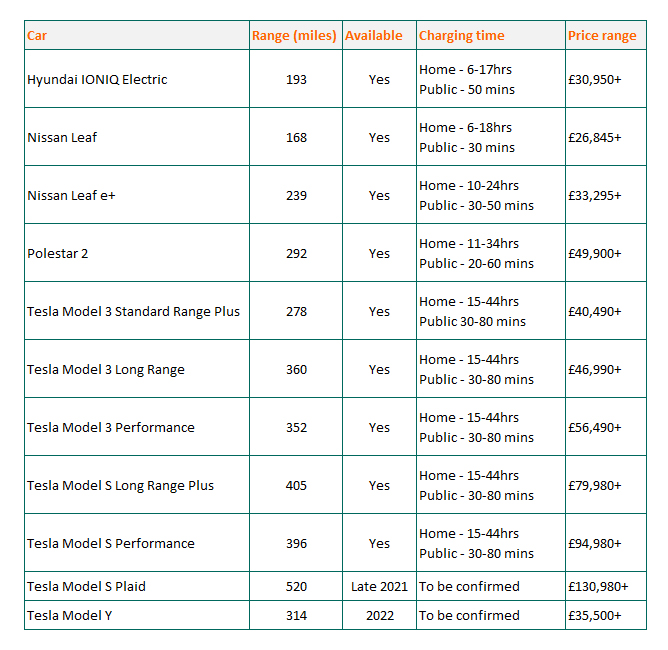
*Statistics for public charging look at how long it takes and how much it will cost to charge the vehicle from 20% to 80%.
**Vehicle cost is estimated as it will vary depending on model, trim and any additional packages.
Small SUV
This is a sector that is growing as more manufacturers realise the value of the small SUV on the road, and how popular they are with consumers who want an SUV but would prefer a smaller vehicle that is practical for driving along narrower and more crowded urban roads.
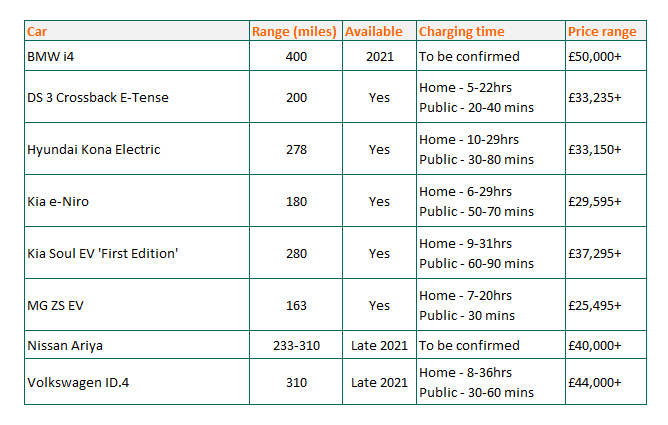
*Statistics for public charging look at how long it takes and how much it will cost to charge the vehicle from 20% to 80%.
**Vehicle cost is estimated as it will vary depending on model, trim and any additional packages.
Large SUV
This is another sector which is seeing growth. In 2019, there were very few cars available which could qualify as an SUV, however, this has changed as more manufacturers are seeing the potential for growth, and the popularity of this sector. At the moment there are three vehicles available, with a further four being launched over the next 18 months.
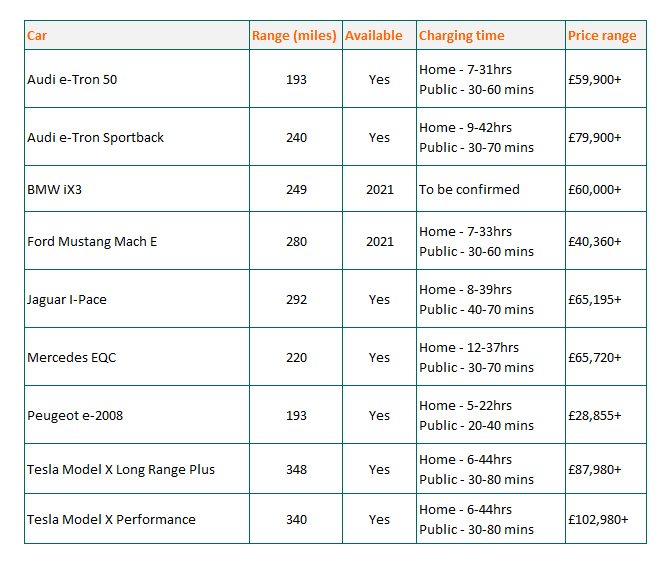
*Statistics for public charging look at how long it takes and how much it will cost to charge the vehicle from 20% to 80%.
**Vehicle cost is estimated as it will vary depending on model, trim and any additional packages.
The Practical Car
If you’re not looking for a car for travelling with the family, instead you’re looking at a car that is perfect for the daily commute, running everyday errands, might be driven to impress and has a range which varies between 55 miles and nearly 300 miles between charges, then this is the segment for you.
This category includes everything from the practical city run-around like the Smart EQ forfour to the incredibly popular and new Volkswagen ID.3.
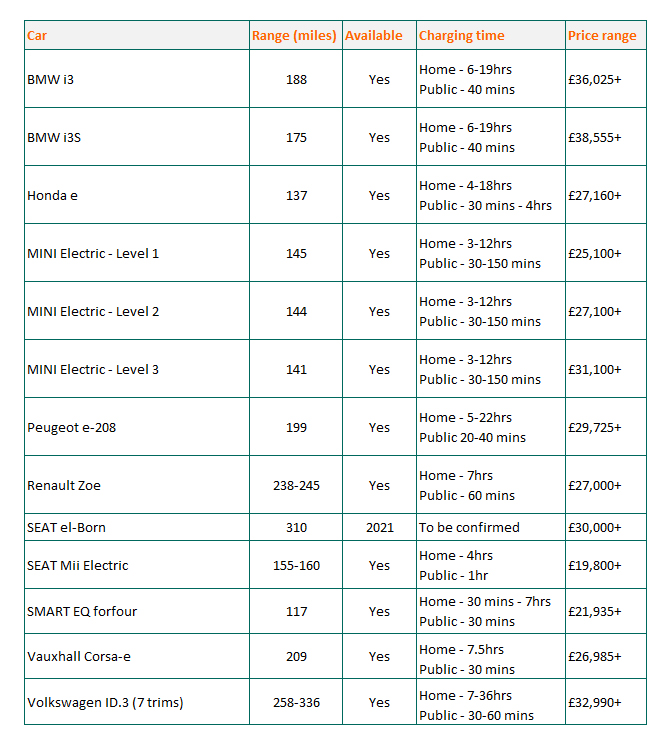
*Statistics for public charging look at how long it takes and how much it will cost to charge the vehicle from 20% to 80%.
**Vehicle cost is estimated as it will vary depending on model, trim and any additional packages.
The Ultimate Compact Car
This particular category is definitely a specialist one. The vehicles are affordable, ideal as a run-around, or for your commute (if it’s short). The reason we would only recommend these as a run-around is due to the fact that they are definitely not suitable for a family, having space for just two people. Due to their size, they are perfect if you live and/or work somewhere where parking is difficult and roads are narrower.
Both of these cars are manufactured by the Mercedes, Swatch partnership brand, Smart. The Smart EQ fortwo and the fortwo Cabrio have a range of between 55-65 miles before they need a full recharge. Both vehicles have a top speed of 81mph, which makes them the ideal vehicles if you’re driving through busy, gridlocked roads. The Smart EQ fortwo coupe costs just under £18,000, though cost depends on trim and any additional packages you decide to purchase. The Smart EQ fortwo Cabrio costs a little more, at just under £20,000 (again, this depends on the type of trim and any additional packages purchased with the vehicle).
Charging the Smart EQ is relatively quick, taking between 4 and 8 hours. As with all electric vehicles it depends on where you are charging and what cable/plug you are using. Charging at home overnight can take up to 8 hours to go from 0% to 100% which will cost an average of £2.22.
Charging costs will depend greatly on the fuel tariff you are on, and the supplier you’re with.
Of course, when charging, please ensure that you aren’t using multiple extension cords to go from plug to the car; recent reports have shown that doing this is incredibly dangerous.]
The Luxury Car
This is the category where you will find cars that are for the aficionado. The higher-end vehicles with the bigger price tags, great miles to the charge, and launch dates which are still to be confirmed.
There are currently very few luxury sports cars on the market which are 100% electric, however, this is changing, with announcements from companies like Lotus, and launches of incredibly high priced hypercars like the Pininfarina Battista, which made its debut at the Geneva Motor Show in March 2019.

Ferrari is a little behind when it comes to electric technology in their cars, however, with the announcement of their latest car, the hybrid SF90 Stradale, it’s possible we will hear something from them regarding an all-electric supercar at some point in the future.
In the meantime, there are some sleek and stylish all-electric cars that will be arriving on the market in the next few years.
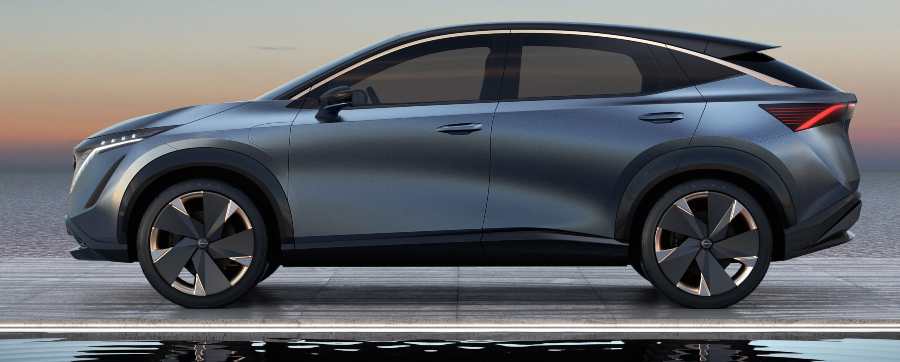
Statistics for public charging look at how long it takes and how much it will cost to charge the vehicle from 20% to 80%.
**Vehicle cost is estimated as it will vary depending on model, trim and any additional packages.
Want to find out more about the benefits of leasing a new electric vehicle? Download our Ultimate Guide to Car Leasing to find out more.
Is an electric vehicle practical for me?
At the 2019 London Motor and Tech show a panel of EV experts talked about the decisions you need to make when considering purchasing or, more likely, leasing an electric car.
During the EV panel a point was made which should not be overlooked, and that is the fact that range anxiety – whether your car can only do 65 miles to the charge like the Smart EQ fortwo coupe, or 295 miles before it needs a charge like the Tesla Model 3 Long Range – is a reason why buyers are still shying away from the idea of going electric. Understandably, drivers who rely upon their cars to run errands, commute to work or carry out the school run on a daily basis, are concerned that the battery will run out of charge when they are driving.
A concern that many motorists raise when asked whether they would consider switching to an electric vehicle is related to ease of accessing charging facilities. Finding a parking space can be difficult, especially when you live in an urban area, therefore there is a concern that finding a parking space with charging facilities will be even harder. The fact that many people who live in built-up areas are unlikely to have a specific parking space for their personal use, and assigned parking is limited in blocks of flats is also an issue that was raised. All these things are seen as obstacles to becoming the owner of an electric car.
At the end of May 2019, OSV conducted a short survey asking users on Facebook what were the reasons why they wouldn’t choose to purchase or drive an electric vehicle. 63% of those who participated confirmed that range anxiety and the issues with charging infrastructure in the UK were the core reason for not considering an electric vehicle as their next purchase. 37% responded that the initial cost of the vehicle was their reason for purchasing something else. The additional complication of charging, cost of battery replacement and concern with the damage to the environment done by production and disposal of batteries were other concerns voiced by commenters when asked for further information.
There have been cases when attempts to charge an electric vehicle which hasn’t quite been parked close enough to a power source to be charged easily has led to danger for the owner. Use of multiple extension cables in order to reach the car has led to accidents which could have been avoided if charging points were easier to access.
Charging in rural areas is another issue. There are a large number of regions in the country (and globally) where access to a charging point is not going to be right on the doorstep. Whether it’s because you are located on a remote farm, or in a small village where permission to dig up roads to fit new power cables is difficult to obtain (something which happens in many villages with ancient foundations).
Will electric vehicles become more practical in the future?
In October 2018 the Business, Energy and Industrial Strategy Committee released a report called Electric Vehicles: driving the transition, which outlines the government plan to deliver full electrification of vehicles in the UK by 2050. The report recognises that there are consumer barriers to purchasing an electric vehicle, and makes recommendations, including grants and incentives in order to encourage more people to make their next car 100% electric.
If you are resident in London and run a micro-business, are a sole trader or a charity then a scrappage scheme has been set up to support you in replacing your existing vehicles so that you are not subject to the charges associated with the emission zones. The grants payable range from £3,500 to £6,000 though criteria are quite strict and if you are a private individual you are not eligible.
If you have an electric vehicle then you can claim OLEV, which is also known as the Electric Vehicle Homecharge Scheme (EVHS). If you have an eligible electric vehicle you are entitled to a £500 grant from the government which goes towards the cost of purchasing a charging point. You can claim the grant for up to two charging points – though only one per vehicle.
As previously mentioned, the provision of charging points is proving to be a very large obstacle for the majority of people who are purchasing new vehicles, and this is something which the committee is aware of. Especially when some regions of the country have such a small number of charging points; Wales, for example, has a total of 31 public charging points, which works out as 1 charging point per 98,000 people. This is certainly impractical and likely the most significant barrier to progress.
At present, the committee is considering proposals that look at how to improve facilities and provision of electric car charging points in publicly available areas.
Oxford is in the process of implementing an Ultra Low Emissions Zone in the centre of the university city, and they have started to test various methods of charging, including pop-up charging stations, and more charging points in council-run car parks. These are currently in the test stage, however, if they prove successful they will be introduced across the city as effective and practical resolutions to the problem.
This report also acknowledged that an increase in electric vehicles would also have an impact on the National Grid, with a requirement for more provision of low carbon power stations as national sources, such as wind farms and solar power are not sufficient.
With a target of 100% electrification by 2050 having been set as a goal by the government, it would be fair to assume that plans are in place to ensure that accessibility to easy-charging, the environmental impact of more power stations and affordability of vehicles are issues that are being considered. And, if this report (which you can read in its 66-page entirety here should you wish to), is anything to go by, then there are solutions for every possible issue connected with producing a realistic and workable infrastructure for a fully-electric road system over the next 30 years.
What’s next for electric vehicles?
As with any new technology, the supporting infrastructure for electric vehicles will take a while to build and once plans are agreed they can still take considerable time to be actioned. With the introduction of the ULEZ in London – with other locations such as Glasgow, Birmingham and Oxford to follow – the pressure on drivers to consider cars with lower emissions, such as hybrid and all-electric, is even greater. However slow the progress, there are a lot of things to take into consideration when looking for your next vehicle, including the benefit your choices might have when it comes to the future.
Since late 2019, the UK Government has been showing a commitment to spending on improvements to the electric vehicle infrastructure across the country, with initiatives being developed to provide a sustainable resolution to the biggest issue cited by car buyers – ‘where can I charge my car?’.
With these developments slowly coming to fruition more charging facilities are popping up in towns and cities, which can only further benefit those who have already invested in an electric future.
The future is looking incredibly positive both for those who have already leased or hired an electric vehicle and those who are starting their journey.
LOOKING FOR AN ELECTRIC VEHICLE?
Contact our specialist team by filling in the form below or calling us on 01903 538835.
Fed up with looking for your next vehicle?
Need advice from an experienced Vehicle Specialist on what vehicle is right for you?
Book your FREE consultation now
